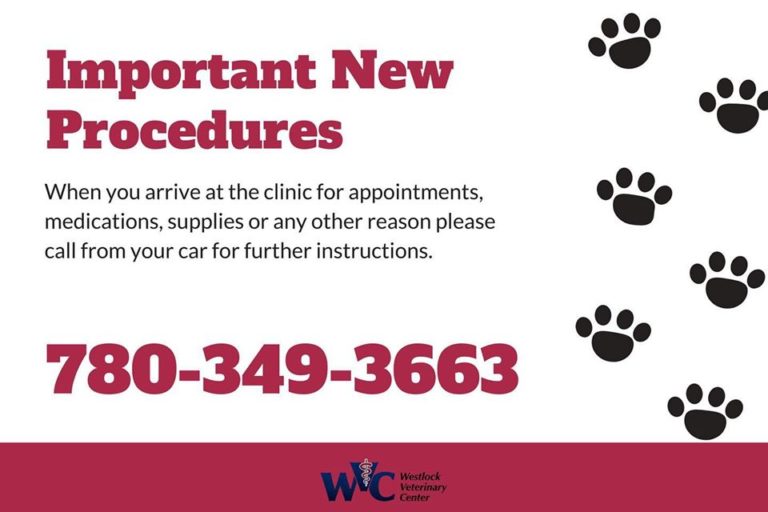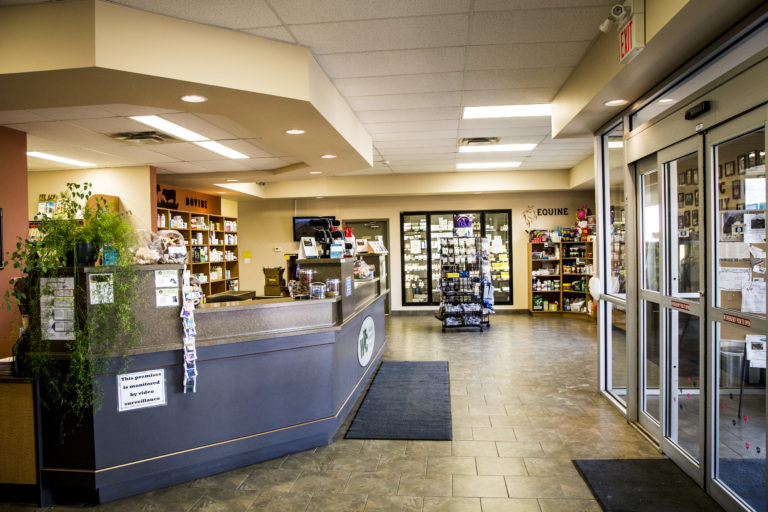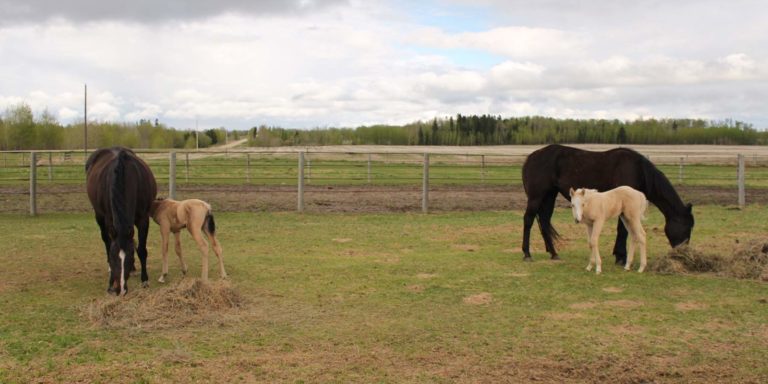Covid-19 Update: Tuesday March 17, 2019
Due to the coronavirus pandemic and new information today, we have updated some of our policies to ensure that all clients, patients and staff are kept as safe as possible.
We politely request that from Wednesday March 18th, that all our clients adhere to the following:
• For those coming in for appointments, we ask that when you arrive to remain in your vehicle and call 780-349-3663, a staff member will then come out to retrieve your pet. Payment can be made from your vehicles with our debit machines or over the phone. Alternatively if you need to attend with your pet, we ask that only one person accompany the pet.
• We are asking ALL clients who are picking up ANY items, including prescriptions, medications, pet food, cattle vaccines and livestock products to call ahead so we can prepare your order, take payments over the phone and bring your items to your car when you arrive. OR we can take our debit machines out to your vehicle along with your order.
• As recommended by the WHO, we would appreciate if you can pay with a card rather than cash.
• We will continue to maintain our excellent cleaning standards and have increased the frequency of cleaning of client areas of the practice. All surfaces and door handles are being disinfected regularly, and all staff are following hygiene procedures.
• Please follow current guidelines regarding personal hygiene and hand
sanitation. Please wash your hands or use hand sanitizer when you enter the clinic.
• If you have a new/persistent cough or a fever, or any symptoms associated with corona virus or other respiratory illnesses, please do
not come to the clinic. If you are self-isolating please do not come to the clinic. In these circumstances, if you require veterinary care,
please phone us for advice. Non-urgent consultations may be rescheduled. We may ask that your pet is brought to the clinic by a friend or relative, or we may advise a telephone consultation.
• If you have any questions or concerns regarding the situation, please give us a call.
Thank you in advance for your co-operation. Please be respectful of our staff who are working hard to mitigate the risks and consequences of this serious situation while aiming to provide you and your animals the best care possible.
780-349-3663
contact@westlockvet.com
Covid-19 Processes
*March 14, 2020, we will continue to update our clients as more information on Covid-19 becomes available or processes change.
At Westlock Vet Center the medical experience of our clients and patients is always our main focus. Now, more than ever, in light of the evolving COVID-19 (Coronavirus) situation, we are focusing on the health and safety of all our clients, patients and employees, without compromising the quality of our veterinary services.
We are closely following the latest information, protocols and tools from the world’s leading health experts and government authorities – including the World Health Organization and Centers for Disease Control – to maximize the effectiveness of our response.
As always, we have stringent practices around sanitization, disinfection and cleaning of all areas of the clinic. We follow rigorous infection prevention and hygiene protocols. The WHO has several recommendations to reduce exposure to a range of illnesses, including hand and respiratory hygiene as well as safe travel practices. There are hand sanitizer stations throughout the clinic for both staff and clients to use on top of already strict washing protocols.
In the interest of all of our clients and staff, the WVC team requests that any clients who are exhibiting symptoms such as fever, cough, shortness of breath, or breathing difficulties refrain from coming to the clinic and consider having a friend or family member bring your pet, or reschedule the appointment entirely. Please call us at your earliest convenience if you have to cancel or reschedule and we will be happy to do so. We have also encouraged staff to stay home should they be experiencing symptoms or if they have travelled internationally. WVC staff members will be minimizing direct human-to-human contact while following all CDC recommended hygiene practices.
The World Health Organization has also stated, “There’s no evidence that dogs can spread the disease or that the disease can cause an animal to fall ill.” We have taken precautionary measures to ensure your wellbeing, along with that of your pets and our employees.
We are doing everything we can to provide a safe and sanitary experience when you visit us. Thank you for your understanding.
If you need to reschedule please call us 780-349-3663
Lung Worm
Recently we have been seeing cases of lungworm in cattle and while it is normal to see a few every year, outbreaks are certainly more common during wetter summers like the one we’ve been experiencing. Lungworm is a parasitic infestation of the bovine respiratory tract ingested from grazing contaminated pasture.
Just like gastrointestinal worms, animals become infested by eating grass contaminated with infective larvae.
However, the difference is, once ingested the larvae migrate through the bloodstream into the lungs where they develop into adults, once in the lungs they cause damage to the air sacs in the lungs and live in the bronchial tubes. Once they are adults they produce a tremendous amount of eggs, the eggs are then coughed up out of the lungs into the trachea and swallowed. These eggs become larvae and are passed in the infested animals feces. The entire cycle takes about one month.
Lungworm is typically seen in older calves from July to October. If left untreated, the disease may not be noticed until after cattle are brought home from pasture. Widespread coughing in a herd is the most notable sign but signs also include weight loss, diarrhea and laboured breathing. Death can occur in heavy infestations.
Finding these larvae in manure is one of the ways we can diagnose the condition. It is a different test than looking for the intestinal worm eggs. While it is treatable, many factors play into what we may recommend for your herd.
If you suspect this pest or have more questions give us a call!
780-349-3663
Potomoc Fever
*ADVISORY*
It’s that time of year again!
It’s been a long wet summer, and we have been starting to see horses with Potomac Horse Fever(PHF) here at WVC.
Potomac horse fever is a potentially fatal gastrointestinal disease that strikes in the late summer months. The disease is infectious, but not contagious between animals. It can effect any breed, sex or age of horse.
It is a disease caused by a microscopic bacteria that grows and multiplies in fresh water. The bacterium, called Neorickettsia risticii, has a critical step in it’s lifecycle that involves snails and insects. It is suspected that horses ingest the insect and bacteria accidentally while drinking standing water or grazing nearby.
While the most common signs of PHF are fever accompanied by loss of appetite, lethargy, and severe diarrhea. Here is a list of the many clinical signs.
• Depression
• Anorexia (not eating)
• Fever
• Colic
• Soft manure/diarrhea
• Dehydration
• Laminitis
• Abortion (occasional)
• Death
Prevention includes limiting exposure to freshwater streams, ponds, dugouts, or other natural water sources especially when insect activity is at its peak. There is a vaccine available; however, PHF has many different strains, which can cause the vaccine to fail as there is only a single strain in the vaccine.
PHF progresses quickly and can be fatal, however it can be treated. Survival rates depend strongly on quick intervention. If you notice your horse is a bit “off” or is showing the above signs of PHF give us a call.
780-349-3663
Horse Vaccines
Horse Vaccination Guidelines
Have you been thinking about horse vaccinations and parasite prevention? We understand that with rapid developments in vaccine technology and a seemingly endless array of products on the market, it’s often hard for horse owners to know where to begin.
We are here to help!
Deciding what vaccines to give your horse, boils down to a few factors so therefore, an effective equine vaccination program begins with a discussion with your veterinarian!
Vaccine Protocols
Core vaccines— recommended as minimum requirement for all horses.
These are:
- Eastern encephalitis (EEE) (aka: sleeping sickness)
- Western encephalitis (WEE) (aka: sleeping sickness)
- Tetanus
- West Nile Virus (WNV)
Other vaccines– recommended based on the use, housing and travel schedule of the horse. Often the following vaccines are recommended in addition to the core vaccines:
- Equine Influenza Virus (EIV) (aka: flu)
- Equine Herpes Virus 1& 4 (EHV 1& 4) (aka: rhinopneumonitits or rhino)
- Strangles– Only administer if the horse has NOT been exposed to or infected with strangles recently (Titers can be performed to ensure the vaccine is safe for your horse).
Some vaccines are recommended based on specific risk or situation/outbreak:
- Strangles – Strep. equi (aka: distemper)
- Potomac Horse Fever (PHV)
- Rabies
Deworming Protocols
Every herd is different. Parasite load is directly related to stocking density, management practices, and individual variation. Fecal testing is highly recommended before deworming to assess the parasite level of the horses in question and whether or not deworming is required. With good management practices, the amount of dewormer required can be reduced.
- Within a herd, there will be some animals with high parasite levels (requiring treatment), some animals with low levels (not requiring treatment), and a spectrum of animals in between. It’s important to know which horses are which.
- Typically your high shedding horses will be consistent year to year. Fecal testing will be able to identify which animals these are.
We are happy to discuss your unique situation, give us a call any time 780-349-3663.



